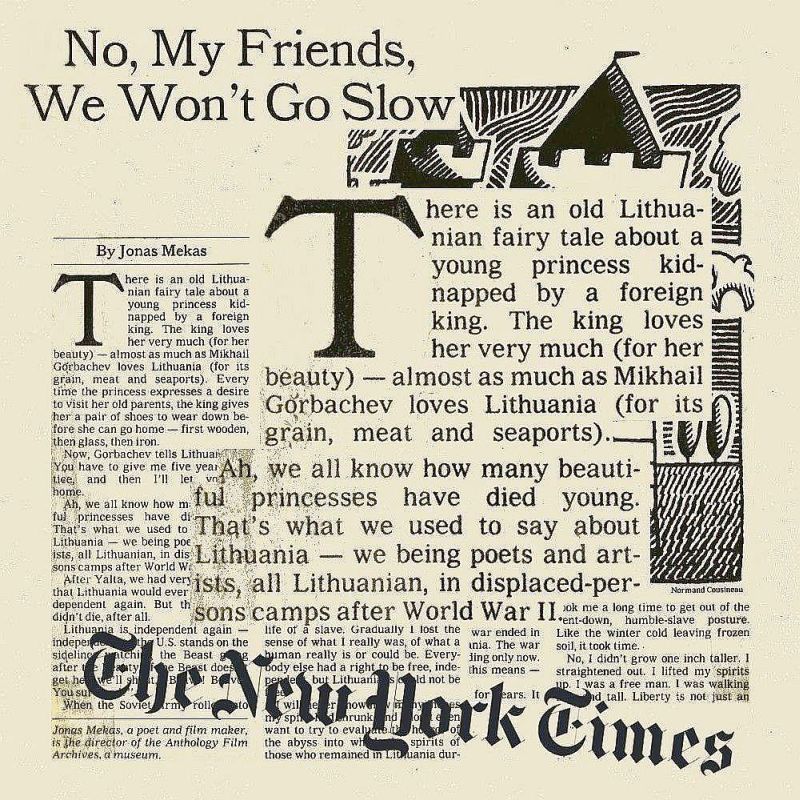The Independence Quotes
The virtual exhibition “No, My Friends, We Won’t Go Slow” The Restoration of Lithuania’s Independence in the Pages of the World Press in 1990.
A quarter of century had passed since the restoration of Lithuania‘s independence. How did the Western world react to Lithuania‘s desire to set itself free? An opportunity to leaf through the pages of newspapers and magazines of that time is presented by a virtual exhibition “No, My Friends, We Won‘t Go Slow”.
The exhibition, which is available through the website of the National Library of Lithuania (www.lnb.lt), contains quotations from the Western press about Lithuania in 1990.
The title of the exhibition was inspired by Jonas Mekas’, a Lithuanian American artist, essay, “No, My Friends, We Won’t Go Slow,” published in the New York Times at the end of March of 1990. An essay, which is a playful Mekas’ reaction to the observations by Western journalists that Eastern Europe should slow down the pace on its way to freedom. By using the Lithuanian folk tale, Mekas compared Lithuania with the beautiful princess, kidnapped by a foreign king. In order to visit her elderly parents, she has to complete a variety of tasks. “Ah, we all know how many beautiful princesses have died young,” writes Mekas.
In spring of 1990, all major Western newspapers mentioned Lithuania’s name almost every day, and very often — on front pages. The exhibition presents quotes from the press of 14 countries, from distant Australia and Brazil to Scandinavia and neighbouring Poland. Quotations are complemented by references to full articles and information about their authors available online.
At that time, Lithuania was a very important subject in the articles of the most famous journalists and political commentators. For example, A.M. Rosenthal firmly supported Lithuania’s independence in his NYT column. Some young authors, whose articles are quoted in the exhibition, today are well known journalists. One of such authors is David Remnick, who at the time was the Washington Post’s correspondent in Moscow, another Maureen Dowd; today both of them are the Pulitzer Prize winners.
However, the events in Lithuania were covered not only by major newspapers and magazines. The exhibition shows that the regional press also wrote about Lithuania. For example, Gießener Allgemeine, small German newspaper, compared Lithuania with the hot potato, which is too hot to hold, yet too valuable to drop.
During this politically intense period, Lithuanians living abroad and Lithuanian friends collected the clippings about Lithuania. Some of them even found it necessary to underline the most important phrases and sentences of the articles.
A very interesting clipping from the Los Angeles Times was sent to President Vytautas Landsbergis by Juozas Brazauskas with the post-note, where he advises the President “to caution his people … to think before they make statements to the press.” The article quotes a young volunteer from Canada who says “we have a music professor for a president, we have a bunch of intellectuals for a parliament, and our government information centre is run by a bunch of college kids.”
The National Geographic described the situation in Lithuania somewhat differently (two copies of the issue dedicated to the Baltic countries are stored in the Lozoraitis’ Family Collection at Lituanica Department): “Behind the doors of government, the heat was on. Declarations, telefaxes, formulations flew between committees of tight-lipped delegates and newly minted founding fathers. … All three [Baltic States] were moving, in their own way, toward separation from the eastern empire.”
The exhibition, which was created by Lituanica Department of the National Library of Lithuania in collaboration with the Ministry of Foreign Affairs of the Republic of Lithuania, is available in English as well.
Valdonė Budreckaitė
